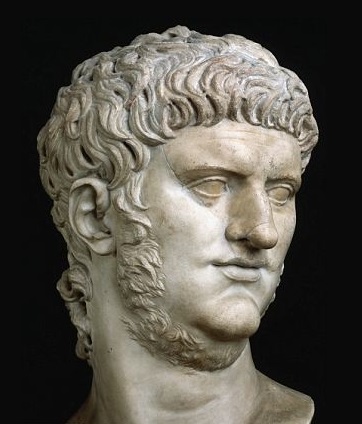
Roman emperor from 54 to 68 AD, and perhaps the most notoriously megalomaniac. Though not mentioned in the NT, Nero was the emperor to whom Paul appealed to have his case heard (Acts 25:11ff & 21ff), and is infamous in church tradition for his persecution of the early Christians; it is probable that both Peter and Paul died martyrs under his reign. But Nero was not always the tyrant he became. In fact the early years of his reign were regarded as some of the best years since the death of Caesar Augustus, and it is most likely that this was the time when Paul wrote his epistle to the Romans.

Nero was born into a family that was banished by Emperor Gaius-Caligula when he was about two years old. A year later his father died. The family was pardoned by emperor Claudius, who later also married his highly ambitious and capable mother, Agrippina the Younger. As a result of this marriage, Nero's position changed, and was officially adopted by Claudius in 50 AD. With the help of Burrus, prefect of the Praetorian Guard, Agrippina fed Claudius poisonous mushrooms at a banquet, and made Nero emperor at the age of 16. Claudius' younger son by an earlier marriage was killed a few months afterwards.
The early months of Nero's administration was heavily influenced by his mother's hand. Increasingly exerting his own will and under the influence of his advisers, he had his mother removed from court. Then began a period of personal debauchery, wanton excess and meaningless and impractical policies. With each passing day his megalomaniacal despotism and deviant sensualism grew. Any one he disliked he forced to commit suicide, or had murdered. He slept with any woman he fancied, openly and without shame. He did the same with any man he liked. His mother attempted to regain her influence and he had her murdered in 59.
Then came a series of disaster that added to the weight that would push him out. In 61 the Roman possessions in Britain suffered a crashing blow from the revolt of Boudicca, the queen of the Iceni tribes. A major fire in 64 destroyed large swatches of Rome, which he blamed on the Christians and had them sent to the games as punishment. Insensitive to the times, he had a magnificent palace, the Golden House of Nero, built on the burnt site, and overlaid with gold, jewels and mother-of-pearls, that drained the treasury. When it was completed he claimed that he could "at last live like a human being." A severe food shortage led to unrest in Rome in early 68. By then everyone had had enough; a revolt broke out in the Senate. When he heard of the sentence the Senate had planned for him, he committed suicide on 9 Jun, uttering, according to Suetonius, "What an artist lies with me!" What he left behind was an empire torn apart by a year of civil war and a name only vilified.

Further Reading:
Edward Champlin, Nero. Cambridge, MA: Belknap, 2005.
Miriam Griffin, Nero: The End of a Dynasty. New York: Routledge, 2000.
Richard Holland, Nero: The Man Behind the Myth. Stroud, UK: Sutton, 2003.

©ALBERITH
231116lch